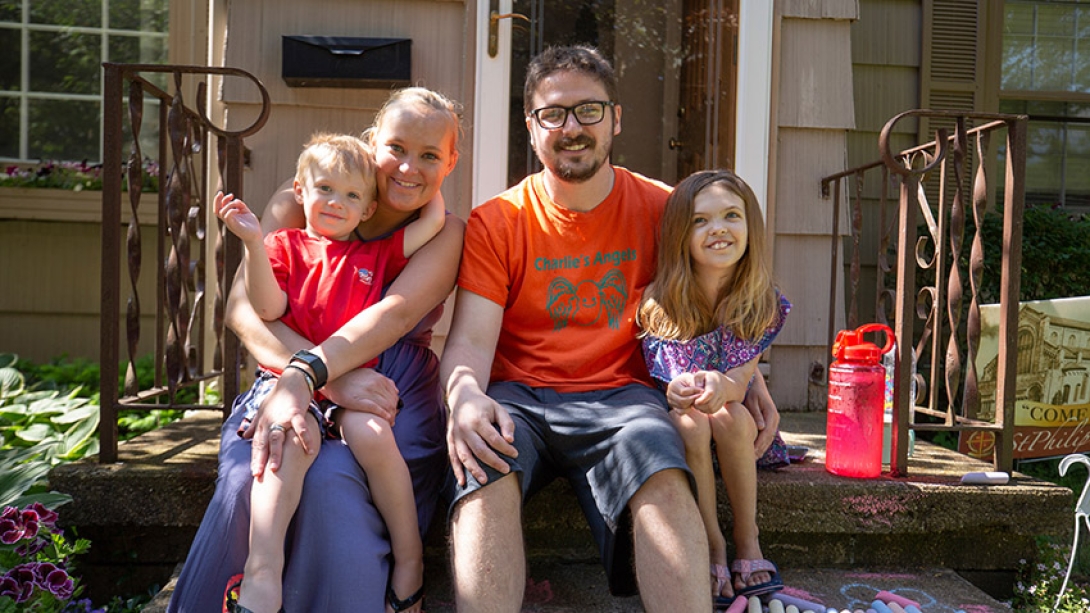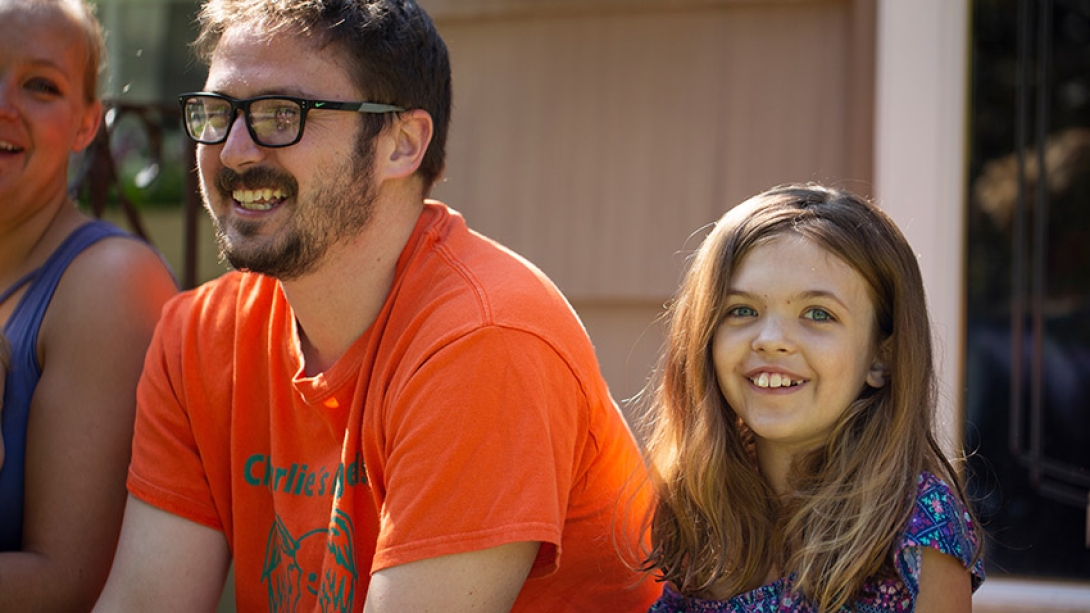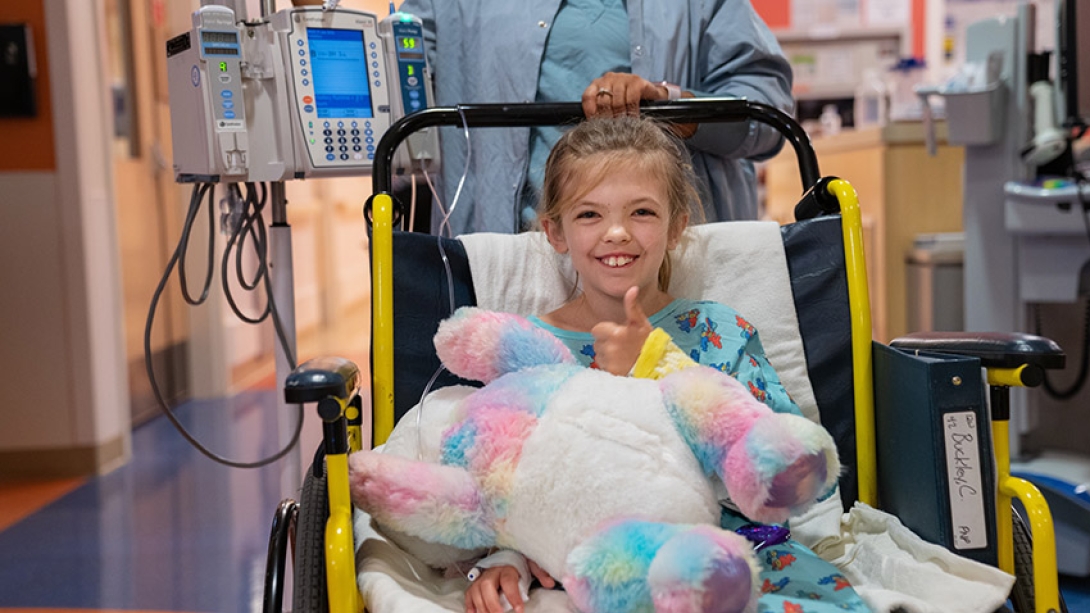Weeks before Father’s Day, dad gives his 8-year-old daughter with a chronic kidney disease a life-saving gift.
10:36 AM
Author |
Eight-year-old Charlie Buckley spent an early morning playing board games in a hospital bed and choosing a name for the new giant "panda unicorn" that would follow her to the operating room: Sparkles.
Meanwhile, on a different side of the Michigan Medicine campus, her organ donor – dad Nick – was undergoing surgery he hoped would help his little girl enjoy a healthier childhood.
"Charlie needed a kidney, and I was a match so it was a pretty easy decision," Nick says. "It's something any parent would do."
And Nick's special gift to Charlie, which came just weeks before Father's Day, also marked an important milestone in Michigan history. The father-daughter kidney transplant became the 3,000th living organ transplant at the University of Michigan Transplant Center since the first one involving identical twin sisters in 1964.
"In addition to being a miraculous moment for Charlie and her family, Charlie's transplant is also a big milestone for us here at Michigan," says U-M transplant surgeon and U-M Transplant Center Director John Magee, M.D. "It reflects a 55-year history of courage and generosity on behalf of so many living donors and a great celebration of humanity."
"It's always special when anyone steps forward and serves as a living donor, but it's especially touching when it's a parent donating to a child or a child donating to a parent," Magee adds. "It really drives home the spirit of family, allowing donors to give someone they love the ultimate gift."
A healthier childhood
At age five, Charlie – who had always seemed healthy – experienced extreme eye swelling that parents Nick and Alexis thought was an allergic reaction. But a urine test prompted greater concerns.
The then-almost-kindergartner was referred to University of Michigan C.S. Mott Children's Hospital in 2015 where she was diagnosed with a kidney disease called nephrotic syndrome, or focal segmental glomerulosclerosis. It meant her kidney was excreting too much protein, preventing the important nutrient from reaching other organs and toxins from being flushed out of her system.

Left untreated, the condition can lead to kidney failure, heart attack, stroke and other major complications.
"That was a tough pill to swallow," Nick says. "But we were grateful to be in good hands here at Mott. Like a lot of other Little Victors, Charlie has a resilient, fighting spirit. Her positive attitude leads the way for us."
For the first couple of years, doctors were able to manage Charlie's condition through medications, but that could only go so far. In fall of 2018, she started dialysis.
Dietary restrictions required a feeding tube to ensure nutrition and the family spent three days a week making the one-hour commute between their home in Battle Creek and Ann Arbor for three-hour dialysis visits.
Because of the time commitment required for treatment, Charlie started homeschool with mom Alexis, who is a special education teacher. She's also missed out on favorite activities, such as this year's daddy-daughter dance.
Her only chance at a better quality of life was through a new kidney – and while other family members were also a match, her dad wanted to be her donor.
Nick spent the past few months staying in shape to make sure the kidney he would be parting with, nicknamed "Lefty," would be ready for the role. He estimates running almost 900 miles since January, including workouts on a hospital treadmill during Charlie's visits.
"We didn't do a good job of giving her a healthy kidney the first time," he says. "I wanted to do better this time."
One family, two surgeries
The morning of surgery, May 22, Nick gave a barely-awake Charlie a quick kiss on the cheek before checking in to University Hospital.
Alexis Buckley remembers the nervous anticipation of both her husband and daughter undergoing surgery at the same time. While a team led by transplant surgeon Chris Sonnenday, M.D., worked to remove Nick's kidney, a surgical team at Mott led by Magee prepared for Charlie's surgery.

The transplant required an experienced team of anesthesiologists, nurses, technicians, nephrologists, social workers, dieticians, pharmacists and psychologists.
"It was a very emotional day," Alexis says, teary-eyed.
And as Alexis and Nick's mother, Cathy Erskine, followed Charlie to the surgical floor of Mott, they briefly caught glimpse of a red cooler being pushed on a cart down another hallway.
Inside was Nick's donated kidney, which registered nurse Janine Robinson had transported across the hospital.
"That was pretty crazy," Alexis says.
Charlie would later tell the story of how her new kidney even traveled "by the cafeteria" before reaching her.
"It's working"
As Nick woke up sleepily from surgery, he saw a missed call from Alexis.
"I called her back and for a few seconds, I could just hear her sniffle. A thousand thoughts crossed my mind before she said anything," Nick remembers. "I'm a pretty optimistic person but I definitely had some dark thoughts during that pause. That was probably the most real it got from me."
But then Alexis finally spoke. "It's working," she told him.
Within seconds of being transplanted inside Charlie's body, the kidney turned from gray to pink and quickly began making urine.
"One of the greatest moments in a kidney transplant is when we sew it in and watch it magically come back to life," Magee says. "It's something we see with every kidney transplant, but it's still miraculous each time."
Later that evening, Nick asked to be pushed in a wheelchair to Mott to see Charlie – just long enough for her to give her dad a thumbs up and big smile before going back to sleep.
Minus some soreness, the father-daughter duo is almost back to their old selves a few weeks later. Charlie, who already had a kidney removed a month before the transplant, gives Nick perspective.

"She said 'Dad, I think if a little girl can do it, a 34-year-old man can do it,'" Nick laughs. "She's already walking laps around me.
"It's hard for me to say I'm not feeling good when she's been dealing with this kind of stuff for years now," he adds. "She's an example for me and helps me in recovery in body, mind and spirit. Crazy that I'm taking the lead from my 8-year-old daughter but she's pretty amazing."
Sitting on the front steps of their house, Charlie recounts one of her favorite stories: telling brother Oliver, 3, about how "Dad gave me his kidney."
His response: "Well, are you going to give it back?"
"I was like 'Um, noooo,' " she says with a giggle.
A new chapter
A big goal was to reduce time at the hospital, but Charlie says she already misses her friends at Mott.
During her nine months of dialysis, she created personal nicknames for many of her care team members, did art projects with her hospital tutor and enjoyed regular music therapy sessions – during which the young singing fan even wrote a rap song about her fistula (an access point in her arm to connect her to the dialysis machine.)
"She just lit up whenever any of them turned the corner," Nick says. "I think it's pretty telling that Charlie actually enjoyed dialysis. It shows what a great job everyone did making the experience as positive as possible. They became like a second family."
Car rides and appointments also led to unexpected family bonding time. Nick and Charlie were often spotted exchanging "sass" during card game UNO, watching superhero television series "Teen Titans Go!" or challenging each other in video games.
"She's definitely a daddy's girl," Nick says. "She has me wrapped around her finger for sure."
But the Buckleys are looking forward to calmer days ahead, including summer beach days, lazy days in the yard and even a trip to North Carolina for a wedding in which Charlie will be a bridesmaid. In the fall, the family's team "Charlie's Angels" will also participate in the Battle Creek NephCure Walk to benefit NephCure Kidney International.
Still, there is no permanent cure for nephrotic syndrome, and Charlie could require more treatment and another transplant down the road.
"Hopefully we can get her back to living as normal of a childhood as possible and doing all of the activities kids her age deserve to enjoy. But we are taking it one day at a time," Nick says.
"We know this may be just one hurdle in a long journey. But we are grateful for the fantastic care we received at Mott and the tremendous support from our family, friends and entire community."
Read Nick Buckley's personal column on his experience in the Battle Creek Enquirer.

Explore a variety of healthcare news & stories by visiting the Health Lab home page for more articles.

Department of Communication at Michigan Medicine
Want top health & research news weekly? Sign up for Health Lab’s newsletters today!





